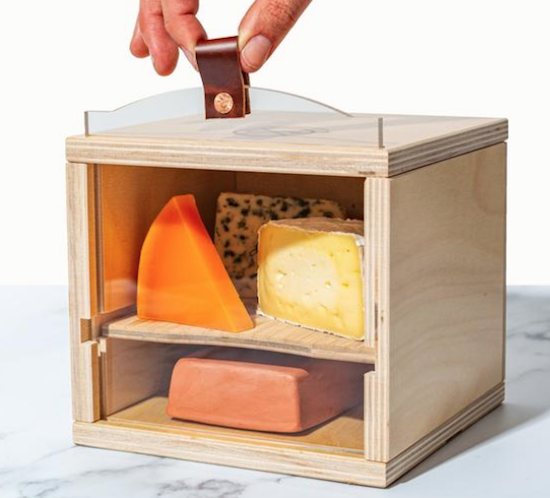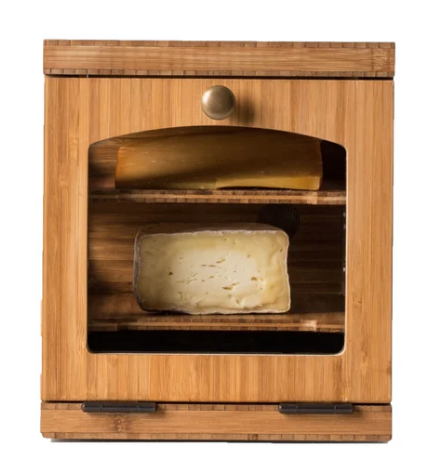Follow Me
Latest Posts
- Organize Your Desktop with Your Perfect Desk Pad: 2025 Update
- How to Use Timers for Improved Productivity — Part 5: Hybrid Timers and Bonus Material
- How to Use Timers for Improved Productivity and Focus — Part 4: Digital Timers
- How to Use Timers for Improved Productivity and Focus — Part 3: Tangible Timers
- How to Use Timers for Improved Productivity and Focus — Part 2: Pick the Right Timer
Search Best Results Organizing
Subscribe to the Paper Doll Blog via Email
Organize Your Holiday Gift-Giving With Social Science Research
Posted on: December 9th, 2024 by Julie Bestry | 16 Comments

It’s that time!
Every December, my professional organizing colleagues and I write blog posts about giving (and asking for) clutter-free gifts, experiential gifts, and gifts that that help you be more organized.
The years I’ve written about consumable gifts, I’ve made myself so hungry that I’ve stopped blogging halfway through to eat close approximations of whatever I’ve researched. And I’ve coveted experiential gifts of practicality, adventure, education, and pampering. I still want the Petite Cheese Storage Vault that I wrote about in Paper Doll’s Holiday Gift List: Warm Their Hearts and Fill Their Tummies.

Apparently it no longer exists, though Cheese Grotto™ seems to have a nice approximation!

But recently, I’ve been reading some scientific research that may help organize and improve the gift-giving process and reduce some of the (emotional and financial) stress around gift-giving.
HABITUATION AND THE DELIGHT OF GIVING
I’m reading Look Again: The Power of Noticing What Was Always There, by Tali Sharot and Cass R Sunstein.

The book is focused on helping us appreciate habituation, the way we are less and less delighted by things — from tangible items to our homes to our relationships — as we get used to them, and how we can change our behaviors (take breaks from our spaces, our habits, social media, and our habitual ways of living) to “resparkle” and appreciate our lives more.
The authors even quote economist Tibor Scitovsky’s classic, The Joyless Economy: The Psychology of Human Satisfaction, explaining that “pleasure results from incomplete and intermittent satisfaction of desires.”
In other words, things are more fun when we do them intermittently, rather than constantly. It’s one reason why we get delight from giving and getting gifts at the holidays. Goodies are nice, but we’d probably get bored, or at least habituated, if we got gifts every day. (OK, yes, I’m sure we’d all like to test that theory out.)
Early in the book, Sharot and Sunstein talk about the values of happiness (however you define it) and having a meaningful purpose are key to enjoying life, but that we tend to habituate to both happiness (new jobs with new salaries or new relationships) and meaning.
As an example, you might enjoy bingeing a TV show, which isn’t particularly meaningful, and the ROJI (return-on-joy-investment, in my own silly coinage) will wear off; conversely, you may invest your time in volunteering, which is fulfilling and purposeful, but you may not be particularly happy if the effort is laborious or wearying. (Why is it that good deeds can be both uplifting and exhausting?)
The authors note that one exception is the joy and meaning that comes from raising children, and they posit that we habituate much more slowly to the “satisfaction” that results from doing things for (or giving things to) others.
They evaluated and built on the social science research of Ed O’Brien and Samatha Kassirer in People Are Slow to Adapt to the Warm Glow of Giving in the journal Psychological Science, and found that if individuals were offered a $5 treat day after day for five days, the sense of joy wore off quickly.
However, when people were given (or “won”) similar funds to spend on others, day after day, while the delight they experienced did lessen somewhat, over the course of the week, they habituated to the “warm glow of giving” much more slowly. Per Sharot and Sunstein, giving “provides a greater sense of meaning than getting” and according to O’Brien and Kassirer, this is because focusing on the act of giving is inked to feelings of social connection, and by extension, value.
This doesn’t mean that you’re always going to feel great about giving your sister-in-law a gift that you know from past experience she will return. However, from an organizational perspective, keeping this concept in mind might help you avoid procrastinating on getting that “difficult” gift.
For example, when you’re dealing with the hubbub of the holiday season and are perhaps feeling dubious about the prospect of shopping or giving the “right” gift, or are even wondering if your efforts will be for naught because the other person won’t be getting you a gift that is as nice or that takes as much effort as you’re putting in, take a breath.
Gift-giving isn’t obligatory, and you need not go into debt for the holiday season. But it’s also not so that you’ll get a gift of equal value and effort. (I mean, it can be, but it shouldn’t be. Let’s organize ourselves out of these habits and attitudes.)
If you are giving gifts, and the shopping and the lists and the traffic are all giving you a headache, pause. Go have a hot cocoa (or whatever overly frothy Starbucksian beverage is your fave) and think about the fact that you’re going to get more sustained joy out of giving gifts that you might think.

Cocoa photo by Sixteen Miles Out on Unsplash
Give yourself kudos and let yourself feel some delight with the knowledge that science says gift-giving is good for you.
WHAT SCIENCE SAYS ABOUT GOOD GIFT-GIVING
Did you know there’s serious research into what goes into giving a good gift? In fact, there’s a lot of it.
In the Society for Consumer Psychology Journal, Julian Givi and his team reviewed more than 160 published research papers on the topic and reported on their findings in An Integrative Review of Gift-Giving Research in Consumer Behavior and Marketing. (If you’re into reading social science research, there are links to the source material at the end of their abstract, and you can read some of the papers through Google Scholar. However, social science research tends to be a little dry, and you might nod off into your egg nog.)
Why understand the science of good gift-giving if we know the mere fact that giving gifts makes us happy?
To start with, a lot of gifts end up in the landfill. According to one estimate in 2017, five billion pounds of gift returns ended up in the landfill! And an updated 2020 estimate placed that figure at 2.6 million tons, and yes, this is just counting the United States. If we give better gifts (and here’s a one of many plugs for experiential gifts, that don’t take take up space anywhere, let alone a landfill), we’ll be kinder to the environment.
Experiential Gifts for the Win!
Every year, I sing the praises of experiential gift-giving. For example, here’s what I said last year, in Paper Doll on Clutter-Free Gifts and How to Make Gift Cards Make Sense:
The social-psychological research is sound — experiential gifts are both more memorable and more satisfying.
Memorable
With rare exceptions of special surprises and greatly anticipated gifts, we tend not to remember the tangible stuff we get. (This also means we often don’t remember the gifts we’ve bestowed on others; my organizing clients and I have discussed how we’ve received quite a few “repeats” from well-intentioned loved ones.)
Tangible gifts rarely take us out of the way we live; they fit into the lives we already lead. We may be changing what we’re wearing or how we’re cooking or what we’re playing with because the new gift varies the activity (as an accessory), but experiential gifts are uniquely different from how we spend our everyday lives. Participating in an experience changes our cognitive and physical lives in a few ways.
Part of the fun is anticipatory. When we get a tangible gift, we unwrap it and then…what? Maybe we’ll use it, maybe we’ll put it away until we think of wearing it or using it (or attempt reading the manual to learn how to use it). But when we get a gift of an experience, from the time we receive the gift card or certificate or gift announcement, we begin anticipating everything it involves. We research and get a sense of what might happen. Our imaginations take the gift we receive and add flourishes to what has been given to us.
When we get a gift of an experience, we begin anticipating everything it involves. We research and get a sense of what might happen. Our imaginations take the gift we receive and add flourishes to what has been given to us. Share on XGive someone a gift that allows them the excitement of anticipating the experience on top of the experience itself and it will be a gift that delights on the holiday, during the intervening period until the experience, and then later in retrospect in the relived and shared memories of the experience. Whoohoo! Now compare that to a sweater or a gadget (if your recipient hasn’t specifically asked for a sweater or that gadget) and you can see how an experiential gift is more nuanced and layered.
Uniquely Satisfying
Experiential gifts are unique. Human beings are social animals and even when we don’t intend to be, we are competitive. We log onto social media, see what our co-workers or our exes’ new partners got for gifts and we compare. Even if we loved our gifts before we logged on, if they got a fancier upgrade or a snootier brand, our holiday cheer is just a bit tarnished. Even if our tangible thing is somewhat superior, the excitement doesn’t last.
However, we don’t compare experiences in the same way. Even if we both went to the same escape room or to Las Vegas or on a cruise, the variables — who we’re with, the weather, our moods, etc. — are going to be so different that there’s no valid comparison. Our experiences are unique to us.
But guess what, it’s not just me saying that!
In reporting on his research review, Givi said that the published papers he looked at found several interesting things about experiential gifts.
What a Girl (or a Guy) Wants
First, as much as we professional organizers have tried to persuade you that experiences are the way to go, gift-givers like giving material gifts but recipients really want gift of experiences. In “Remember me, will you?”: Overusing Material Gifts for Interpersonal Memory Management, researchers found:
Givers are more likely than recipients to consider the memory consequences of gift options, as givers intuitively use material gifts as interpersonal mnemonic devices to facilitate the recipient’s retrieval of giver-related memories. As such, this preference discrepancy occurs in various stages of developing relationships but is mitigated in very close relationships.
In other words, “Hey, mom, remember when I got you that expensive hair dryer made by the people who made your vacuum cleaner?”

We’re often focused on trying to make sure our recipients remember not just the gift (which, as I’ve already suggested above, is less likely with tangible things than experiences) but remember that we were the ones who gave it. I mean, I don’t want to say we’re being manipulative when we do that, but there’s obviously some ego involved. Are we buying love? Are we jockeying for position in the family hierarchy relative (no pun intended) to our siblings? Are we trying to get our in-laws to stop referring to us by our significant other’s ex’es name?
Personally, I suspect that if you give your Aunt Sylvia a gift certificate for a massage or Gramps a National Parks pass, they’re going to remember where the gift originated from a lot more than they would with a fuzzy sweater or a book about World War II.
Don’t Focus on the Face!
Second, not only do we not give people what they want (leaving aside the people — usually teens — who are very specific about what they want), but research says that we tend to give people what will yield a more (visibly) positive reaction than one what will actually satisfy them!
In The Smile-Seeking Hypothesis: How Immediate Affective Reactions Motivate and Reward Gift Giving, researchers found (through six (!) studies) that people put a lot of effort into giving gifts based on what they anticipate the recipient’s reaction will be, “independently (and even in spite of) anticipated recipient satisfaction.”

(When the first of my friends had a child, I put way too much effort into imagining how they’d react when opening the gift. Given my terrible job trying to wrap a stuffed lion, I suspect the emotion was pure relief that the gift was finally uncovered!)
If you’re dealing with a five-year-old, the “affective reactions” and their feelings about their Barbie or video game will likely be the same, but adults mask their true feelings and give socially-acceptable reactions to gifts. (Think about how moms and dads made a huge show of getting misshapen clay ashtrays as gifts even if they didn’t smoke, or how fancy-pants successful young adults in Hallmark movies give their parents expensive but impersonal gifts when the parents just want their kids home for the holidays on their reindeer milk farm.)
One other intriguing thing: this “reaction-maximizing preference” where givers focus on reaction rather than recipient satisfaction was lessened when the gift wouldn’t be opened in the presence of the giver.
Apparently, we try to psychoanalyze our recipients and figure out what’s going to make them make us feel good about what we gave them. If we’re not going to be there to see their faces, especially in this era where almost nobody sends thank you notes, we don’t fret as much about their reactions.
Maybe this explains why we’re less likely to give experiential gifts? There’s a ritual involved in unwrapping a gift and showing it off to all in attendance, and you can’t really do that to the same effect with a gift certificate, theater tickets, or a fancy reservation.
We don’t know that’s what we’re doing, so it’s not like we’re monsters, but maybe now that we know, we can reign in this behavior? (If nothing else, you can share this post with your significant other so that when your whole family is exchanging gifts and you get something wildly inappropriate that you know you’re supposed to gush over, you can tug on your ear Carol Burnett-style to share an understanding of the ridiculousness of the situation.)
Build Stronger Connections
Third, Givi found another reason for giving gifts of experiences that I’ve never touched on in all the years I’ve written about this topic. He notes that in Experiential Gifts Foster Stronger Social Relationships Than Material Gifts in the Journal of Consumer Research, Cindy Chan and Cassie Mogilner found that, as the title notes:
…experiential gifts produce greater improvements in relationship strength than material gifts, regardless of whether the gift giver and recipient consume the gift together. The relationship improvements that recipients derive from experiential gifts stem from the intensity of emotion that is evoked when they consume the gifts, rather than when the gifts are received. Giving experiential gifts is thus identified as a highly effective form of prosocial spending.
Which is all a dry, academic, social science-y way of saying that when you give someone an experiential gift — even if they’re not going to be having the experience with you — it strengthens the bonds between you.
And further, the Big Wow of emotion doesn’t come at the moment when you tell someone that you’ve bought them tickets to Hamilton (though they’ll likely be super-psyched) or a year’s supply of car washes; it comes when they’re all dressed up and humming “The Room Where It Happens” or driving through the car wash without having to open their wallet.
Other Findings About Gift Giving
Skip the novelty gifts — Once again, gift-givers are focused on the moment the gift gets unwrapped.
I get it. You see something cute or funny or outrageous and want to see your giftee’s expression when they see they got Big Mouth Billy talking bass, but aside from the fact that it’ll be one of the first things their eventual professional organizer will be helping them let go of, recipients are focused more on the long-term utility of a tangible (non-consumable) gift.
Skip grand but meaningless gestures — Similarly, a gift that evinces shock, surprise, or humor isn’t as big a draw as things that are useful. If your recipient has an Amazon wish list, look at it and select a gift from it. (If you must do something that reflects your personality, make that a stocking stuffer or night 7 Hanukkah gift.)
Rethink gift cards — As I wrote about last year, gift cards give people flexibility. Yes, there are some negative connotations surrounding gift cards among the Silent Generation and older Boomers. But the younger people are, the happier they are likely to be if they get a gift card that reflects their tastes. (Still, unless they asked for it, don’t give your spouse a gift card as their main gift. Figure out what they really want.)
If you give a Dungeons & Dragons dungeon-master a gift certificate to her favorite game store or a fashionistas gift cards to their favorite clothing shops, letting them pick out what’s perfect for them, you’ve ensure that the thought does, indeed, count, and the thought is that you know them well enough to guess, at least generally, and care enough not to impose your own tastes.
Don’t be afraid to be sentimental — Researchers (such as in the Journal of Personality and Social Psychology) have found that people tend to avoid giving sentimental gifts because they may seem schmaltzy or fear they will miss the mark. A candle or a picture frame may seem safe, but is “safe” the way you want to go when giving a gift to someone you love? I think not.
And again, as with experiential gifts, sentimental gifts have a value that keeps you off the hedonic treadmill.
You remember the hedonic treadmill, right? As I wrote in Toxic Productivity Part 2: How to Change Your Mindset,
In the famous story of Diderot’s dressing gown, the French philosopher was gifted a fancy robe to replace a tatty one. As Diderot got used to his new dressing gown, he came to see his sense of self as defined by its finery. He felt dissatisfaction with his older possessions and began of spiral of 18th century keeping-up-with-the-Joneses consumerism, replacing the perfectly good items associated with his old life and going into debt to keep up with the identity of the new.
Just as experiences are unique and uniquely satisfying, sentimental gifts that recall (and reinvigorate) personal relationships — gifts like photo books, albums, family recipe collections, and anything that evokes memories — are unique to those involved. You don’t habituate to sentimental gifts the way you do to an air fryer or bathrobe.
So, to wrap it up:
- Remember that gift-giving will make you feel good.
- Take your ego out of gift-giving and focus on the recipient’s needs and tastes.
- Give gifts of experience because they’re meaningful, recipients like them, and it’ll bring you closer together.
- Don’t focus on the big reveal (when they unwrap the gift) or your recipient’s social-norm-induced reaction.
- Think about what they asked for, what you know about their tastes, and what will make them really happy.
RECAPPING THE BEST OF PAPER DOLL’S GIFT-GIVING ADVICE
If you need some inspiration for what to get the people in your life this holiday season, I invite you to explore some of my posts over the last few years.
Paper Doll on Clutter-Free Gifts and How to Make Gift Cards Make Sense

Paper Doll’s Ultimate Guide to Clutter-Free Experiential Gifts: Adventure, Practicality & Pampering (Note: this is one of my of all of my holiday posts over the last 17 years.)

Paper Doll’s Ultimate Guide to Clutter-Free Experiential Gifts: Educational

MORE GOOD ADVICE FROM MY COLLEAGUES
Collectively, my colleagues have written too many stellar posts on giving great clutter-free, experiential, or organizing-themed gifts over the years for me to name them all. However, I think you’ll enjoy taking a peek at these recent posts:
Great Organizing and Productivity Gifts for 2024 from Seana Turner of The Seana Method is chock-full of gifts that — if you are set on giving someone something to unwrap — will solve organizational problems without screaming “I’m practical and boring!” (I’m partial to the rechargeable lamp and the cool yoga storage tube.)
Tons of No-Clutter Gifts for the Holidays from Sabrina Quairoli of Sabrina’s Organizing focuses on consumable gifts (so, yummy!), memberships, and charitable donations, as well as her Sabrina’s take on experiential gifts with days/evenings out and lessons.
Plus, The Spruce interviewed three professional organizers for their 5 Holiday Gifts That Will Only Make Your Home More Cluttered, According to Organizers, and I have to say I agree.
That said, I have to admit that I’m a sucker for coffee mugs with messages or images that delight. Several years ago, my colleague Dr. Regina Lark gave me a coffee mug with a funny (though naughtily unprintable in a “family” blog) message that delights me each morning that it comes up in my rug rotation. Also, I really like my Mr. Rogers mug. (His sweater changes colors when you pour in a hot beverage!)

Again, this is where knowing your recipient is important!
As this post goes to press, you’ve got about two and a half weeks until Christmas and the start of Hanukkah. I hope today’s post and the links to past advice will help you find delight in giving.
Paper Doll Post:




Great new twist on this subject!
I’ve loved the idea of experiential gifts for a long time, and a couple of times have given our kids and their families tickets or a gift certificate so they could go somewhere, but now that the grandchildren are a bit older, this year the 10 of us are going to see “A Christmas Story: The Musical” followed by dinner at a nice restaurant. I can’t wait!
What a wonderful all-family gift! I’m so excited for your whole family to enjoy this experience. Maybe you can write about it after the fact and use that for a post?
Thanks for reading and sharing your fun plans!
One gift that I am giving this year to my son is also a gift to me. I purchased tickets for Love Labour’s Lost at the Shakespeare Tavern where we will also get a meal. We go in January, and I know we will both enjoy the experience.
I do spend quite a bit of time trying to find the “right” gift for everyone on my list but the older I get the easier it is for me to say, “Good enough!”
Oooh, I just looked that up to see if it’s in Atlanta. That sounds like so much fun. Do you know which play you will be seeing? It looks like they’re doing two different shows in January: Shakespeare Out of a Hat, where on each of three nights they’ve got the actors but they don’t know which of three performances they’ll be doing (Much Ado About Nothing, A Comedy of Errors, or Twelfth Night) and later in January, it’ll be Love’s Labour’s Lost. Whatever it is, I know you’ll have an adventure to remember!
Good enough is plenty good. I agree! Thanks for reading!
I’m going to read this book, Julie: Look Again, Look Again – it is right up my alley. Thank you for that.
I usually love going shopping for gifts – both experiential and material. For some reason, this year has felt off to me. I haven’t figured out quite why yet – but I will.
My sister-in-law and I almost share our birthday – her birthday is the day after mine. When we lived in Connecticut we bought tickets to a Broadway show and then met our husbands afterward for dinner (although sometimes they came with us). Now that she and my brother have moved near Charleston, we give each other the experience of a house and garden tour. I love it when the gift sharing becomes a tradition.
Great post.
I’m still reading Look Again, but already knew I was going to recommend it to you as the book I read last month, the 7 1/2 Lessons about the Brain, was your blog’s recommendation!
This has been an odd year; everyone seems to think so. Thanksgiving seemed to come up with less fanfare, and everyone seems to be a little out of sorts with the holidays. I have my theory, but what matters is that you and yours stay healthy and find a way to make it special.
Oooh, a house and garden tour sounds interesting (though not as festive as a Broadway show). Do the menfolk come on the tours? I hope your next set of tours is a delight.
Thanks for reading and for the positive feedback!
I think that quote about upping our pleasure by doing things intermittently is so true. I love the beach… a lot. BUT, if I went every day, it wouldn’t be so special. In fact, even as the summer draws to a close I find myself less eager to hop in the car and head to the beach than I do in May.
That whole idea about giving gifts to get a specific reaction is tricky. I’ve learned over time that people in my family react with differing levels of intensity. Some are big reactors, while others seem to hardly react at all. If I determine that the “success” of my gift will be gauged by their reaction, I’m likely to be disappointed.
Over the years, I’ve come to think that the best gift is one that reveals how well I know the other person. How much I have thought about him or her, and how hard I’ve tried to get them something that shows this. There is a Hallmark movie about a guy that people hire to get the “perfect gift.” Of course, he ends up getting the girl.
Experiential gifts are wonderful, as are consumables (I’d eat that cheese!) It is important to not give a gift that requires the person go outside of their comfort zone. This can feel like an obligation instead of a treat.
Terrific advice on all things “gifting!”
I know what you mean. Even ice cream, if you have it every day, loses some of its sparkle.
Yes, you can’t give to get a reaction. Over the years, I’ve given my sister things she’s asked for, and things I thought would be huge surprises. It’s taken me a long time to learn that my mellow sister is a mellow recipient. 😉 Doh!
The perfect gift he got for himself was the girl? Very Hallmark of him!
You and I will have to get together for some cheese tasting. And you’re right; it’s too common for a gift that the giver feels is exciting to be too much out of a recipient’s wheelhouse.
Thank you for reading my “term paper” on gifting research.
Gift-giving is one of my favorite topics, and I read your post with rapt attention. My gift-giving habits have changed dramatically over the years, as I have dealt with clients’ clutter and made less money (compared to my previous corporate career). I’m a fan of gift cards (which can be used for tangible, consumable, and/or experiential gifts) and agree that the best ones reflect the recipients interests.
Two great reasons (well, it’s not great to make less money) to change your gifting habits. In high school and college, I spent a lot of effort trying to pick the perfect gift for each friend. When my friends started to have kids, I shifted to buying for their tiny humans. And yes, as an organizer, I’ve been less and less likely to buy tangible gifts, particularly those you can’t “do” something with.
I’m glad to see that you agree with the research! Thanks for reading!
I am 100% on board with gifting and receiving experiences, not things. My husband gave me a fun weekend for my birthday, and I can’t wait. That anticipatory effect is real. November was my birthday month, and our ‘date’ is January. So I get to think about it for almost two months, enjoy the experience, and then have it in my reserves to return to after our time together.
My kids also prefer receiving experiences, not things, and we do our best to honor their wishes.
The reality is none of us need more stuff. I’m at the point where dispossessing is more frequent than acquiring. And with that is the realization that there is more life behind than ahead. So, the more time I can spend with my loved ones and friends, the better.
Thank you for sharing the research behind going experiential. I also added “Look Again” to my reading list. That’s a physical thing I would love to own. 🙂
Yes! And the anticipation is a gift you give yourself based on the gift of the experience! I can’t wait to hear what you end up doing on your special weekend in January!
Experiences are, as I wrote, more memorable and unique to us. I remember every day of my trips to Italy and the UK, but I couldn’t tell you which year I got which books or CDs.
I’m glad you were intrigued by Look Again — I really hoped you would — and the research on gifting. This was definitely a different kind of post, and I’ll probably go back to gift ideas in the future, but this will allow me the “pleasure [that] results from incomplete and intermittent satisfaction of desires.”
Thanks for reading and sharing your thoughts!
Gift-giving is always a challenge for me. I never know what to give certain people. I usually give consumable gifts and usually my husband and I pick up one item that we need or want for our home and gift each other with it. This year it’s a really nice coffee grinder.
Consumable gifts are great because (as long as the person isn’t allergic), you can’t go wrong. Everyone eats, and everyone needs a yummy treat. And that coffee grinder will give you warm, yummy joy each time you brew a pot or a cup. You’ll hear that ZZZZZZzzzzzzzZZZZZZ buzz and be reminded that it was a couple’s gift you shared.
Gift-giving can be tricky, but hopefully between this research and the advice in the various articles, you’ll find some good ideas. Thanks for reading!
Excellent information, always, Julie. Thank you for sharing my post about no-clutter gifts.
I am known for giving sentimental gifts. Some years back, I was converting Super 8 silent home movies to DVDs and found a ton of footage for my cousin who’s house caught on fire when she was young. So, I created a video just for her, and she loved it. Plus, I could get rid of the Super 8 reels and convert to DVDs. It was a win-win.
I also love making food gifts like hot chocolate mason jar powder from scratch, Chex mix (something I am doing this year), flavored olive oil, etc… making food for my clients and family/friends is fun. I never make anything that is too complicated. With food being so expensive, it’s nice to be able to give unique food gifts.
I hope you are having a great holiday season.
That’s amazing that you did that for your cousin, Sabrina. Sentimental win-win!
Thank you for taking the time to read and share your thoughts. I hope your holiday is joyous and memorable!